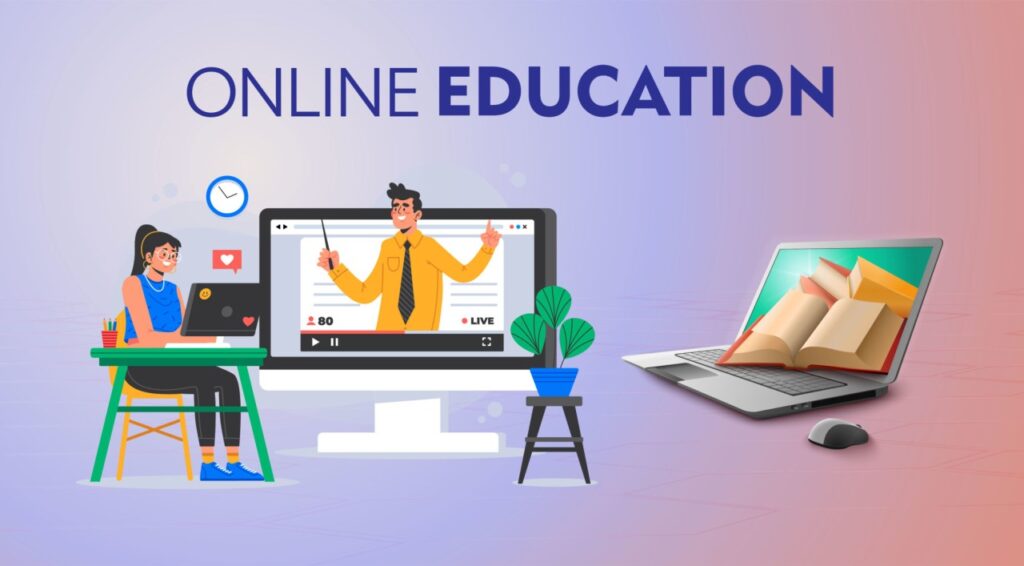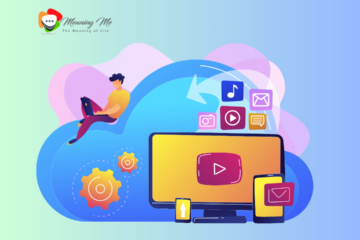Online education is becoming increasingly important in today’s world. It offers several advantages over traditional classroom-based learning, making it a valuable option for students of all ages and backgrounds.

(Photo Credit; Linkedin)
Introduction
Online education has emerged as a pivotal component of modern education systems, revolutionizing the way knowledge is disseminated and acquired. With the rapid advancement of technology and the widespread availability of the Internet, online education has transcended geographical barriers and transformed traditional notions of learning. Online education, also known as e-learning, encompasses a diverse range of educational activities conducted over digital platforms, including virtual classrooms, webinars, interactive tutorials, and online courses. This innovative approach to education offers unparalleled flexibility and accessibility, empowering learners to pursue their educational goals from anywhere in the world, at any time convenient to them. Whether it’s acquiring new skills, earning academic qualifications, or accessing specialized training programs, online education provides learners with a myriad of opportunities to expand their knowledge and enhance their capabilities.
One of the key advantages of online education is its ability to cater to diverse learning needs and preferences. Through the use of multimedia resources, interactive exercises, and adaptive learning technologies, online education offers a dynamic and personalized learning experience tailored to the individual needs of each learner. Moreover, online education allows learners to progress at their own pace, enabling them to revisit difficult concepts, explore additional resources, and engage in self-directed learning activities. This self-paced learning approach not only enhances comprehension and retention but also promotes independent thinking and problem-solving skills, essential attributes in today’s knowledge-driven economy.
Furthermore, online education fosters inclusivity and accessibility by breaking down barriers to education faced by individuals with physical disabilities, geographical constraints, or other limitations. By providing an alternative mode of learning that is not bound by traditional classroom structures, online education enables a diverse range of learners, including working professionals, stay-at-home parents, and individuals with busy schedules, to pursue their educational aspirations without compromising their other commitments. Additionally, online education promotes lifelong learning by offering a wide array of courses and programs catering to learners of all ages, backgrounds, and interests. Whether it’s acquiring new skills for career advancement, exploring personal interests, or pursuing higher education, online education empowers individuals to embark on a continuous journey of intellectual growth and self-improvement.
Moreover, online education has the potential to democratize access to education on a global scale, particularly in underserved communities and developing regions where traditional educational infrastructure may be lacking. By leveraging the power of digital technologies, online education can reach remote areas, bridge the digital divide, and provide educational opportunities to individuals who would otherwise have limited access to quality education. This democratization of education not only promotes social mobility and economic empowerment but also fosters a more equitable and inclusive society.
In conclusion, online education represents a paradigm shift in the field of education, offering a transformative approach that is flexible, accessible, and inclusive. As technology continues to evolve and digital literacy becomes increasingly prevalent, online education is poised to play an even more significant role in shaping the future of learning. By harnessing the power of digital technologies to democratize access to education, promote personalized learning experiences, and foster lifelong learning, online education holds the potential to empower individuals, enrich communities, and drive positive societal change.
Online education has become increasingly important for several reasons.
- it offers unmatched flexibility. Students can learn at their own pace, around work or family commitments, and access materials anytime. This makes education accessible to a wider range of people, including those in remote locations or with busy schedules.
- online platforms provide a vast variety of courses and programs. Learners can choose from specialized topics or even pursue degrees entirely online, often at a lower cost than traditional institutions.
Students develop time management and self-discipline by structuring their learning. Online environments also encourage communication and collaboration through discussion forums and group projects, all valuable assets in today’s job market
While online education may not be for everyone, it offers a powerful tool for making education more accessible, affordable, and adaptable to the needs of modern learners.
Table of Contents
Advantages of Online Education
The landscape of education is rapidly evolving, and online education has emerged as a powerful force driving this change. This dynamic and accessible approach to learning offers a multitude of advantages, making it a crucial factor in democratizing education and empowering individuals to achieve their academic goals. Let’s delve into the key benefits that make online education so important:
Flexibility
Affordability
Accessibility
Diverse Learning Styles
Self-paced Learning
Increased Course Variety
Development of Essential Skills
the flexibility of online education
The flexibility of online education is one of its biggest strengths. Here’s how online learning offers a more adaptable approach to acquiring knowledge
- Learn at your own pace
- Schedule on your terms
- Location independence
- Asynchronous learning
Accessibility of online education
Online education has the potential to be a game-changer in terms of accessibility, breaking down barriers for learners with disabilities, and creating a more inclusive learning environment.
- Reduced physical barriers
- Accessible content
- Closed captions and transcripts
- Screen readers and text-to-speech tools
- Keyboard navigation
- Adjustable font sizes and color contrast
- Digital divide
- Technical barriers
- Lack of social interaction
Diverse Learning Styles
Traditional classroom settings can sometimes struggle to cater to the unique learning styles of every student. This is where online education shines. One of its greatest strengths lies in its ability to address the diverse ways individuals learn and absorb information. Here’s why online education is particularly important for accommodating various learning styles:
- Multimodal Learning
- Personalized Learning Paths
- Collaborative Learning Opportunities
Affordable online education
Online education is generally considered a more affordable option compared to traditional on-campus programs.
- Lower tuition fees
- Reduced living expenses
- No commuting costs
- Fewer course material costs
- A flexible schedule can lead to income opportunities
- Technology requirements
- Course fees and additional costs
- Not all online programs are affordable
Self-paced learning online education
Self-paced learning is a cornerstone of online education, offering a strong advantage for many students.
- Control over Your Schedule
- Tailored Review and Reinforcement
- Accommodating Different Learning Styles
- Staying Motivated
- Time Management Skills
- Developing Self-Discipline
Develop digital skills in online education
The digital world is constantly evolving, and having the right digital skills is crucial for success in today’s job market and daily life. Luckily, online education provides a wealth of resources to help you develop and refine these essential skills.
- MOOCs and Skill-Specific Courses
- Interactive Learning and Gamification
- Expert-Led Tutorials and Certifications

Photo Credit; Edu
Developing Specific In-Demand Skills:
Online education has become a game-changer for developing specific, in-demand skills. Gone are the days of rigid schedules and geographical limitations. Now, you can learn the latest tools and techniques from industry experts at your own pace, from anywhere in the world. With a vast array of online platforms offering courses on everything from coding and data analysis to digital marketing and cybersecurity, you can tailor your learning journey to match your exact career goals. Furthermore, many online courses provide real-world projects and hands-on experience, allowing you to build a strong portfolio to showcase your newfound abilities to potential employers.
- Coding and Programming.
- Digital Marketing and Social Media
- Graphic Design and Multimedia Skills
- Data Analysis and Cloud Computing
Enhancing Essential Digital Literacy:
Online education can be a powerful tool for enhancing essential digital literacy skills. By participating in online courses, students gain hands-on experience with various digital tools and platforms. This could involve using learning management systems, collaborating in online forums, or creating presentations with digital software. These activities not only help students develop technical proficiency but also foster critical thinking and information evaluation skills. As they navigate the online learning environment, students learn to assess the credibility of online resources, identify bias, and become discerning consumers of information. This newfound digital literacy empowers them to become more effective learners and confident participants in the digital world.
- Basic Computer Skills
- Cybersecurity Awareness
- Communication and Collaboration Tools
variety of online education
The variety of online education is truly vast and encompasses a wide range of learning styles and interests
- Formal Degrees and Certificates
- Massive Open Online Courses (MOOCs)
- Micro-credentials and Skills Training Professional DevelopmentSelf-paced Learning Platforms
- Informal Learning Resources
DISADVANTAGES OF ONLINE EDUCATION
Absolutely, while online education offers a wealth of advantages, it’s important to acknowledge its limitations as well. Here’s a breakdown of some key disadvantages and why they matter:
Drawbacks of Online Education: A Balanced Perspective
While online education offers flexibility, some drawbacks exist. Lack of face-to-face interaction can hinder communication and motivation. Social isolation and difficulty developing strong communiccheck for skills are potential downsides. Online learning requires self-discipline to stay focused and avoid distractions, making it less ideal for some students.
Why These Disadvantages Matter
Understanding these limitations is important because online education isn’t a one-size-fits-all solution. Some students may find these drawbacks significantly impact their learning experience. It’s crucial to weigh the pros and cons carefully when deciding if online education is the right fit for you.
However, it’s important to remember that many online programs are constantly evolving to address these challenges. The development of interactive learning tools, virtual reality experiences, and online communities fosters a more engaging and collaborative online learning environment.
By acknowledging both the advantages and disadvantages of online education, we can create a more informed discussion about its role in the future of learning.
- Lack of Face-to-Face Interaction
- Limited Hands-on Learning
- Technical Difficulties
- Self-Discipline Required
- Isolation and Loneliness
- Reduced Focus and Distractions
Lack of Face-to-Face Interaction
Certainly, lack of face-to-face interaction is a well-recognized disadvantage of online education.
One significant drawback of online education is the absence of in-person interaction. The ability to connect with classmates, build rapport with instructors, and participate in lively classroom discussions can be diminished in an online setting. This social aspect of learning can be crucial for motivation, engagement, and developing interpersonal skills.
Limited Hands-on Learning:
Limited Hands-on Learning: A Hurdle Online Education Must Jump
One of the most significant disadvantages of online education is the limited opportunity for hands-on learning. This is especially important because practical experience is crucial for developing skills in many fields. Here’s why limited hands-on learning matters
Technical Difficulties
Online education offers a dynamic and accessible path to learning, but it’s not without its challenges. One of the most significant disadvantages is the potential for technical difficulties. These disruptions can significantly hinder the learning experience and highlight the importance of robust solutions for online education to thrive. Here’s why technical difficulties matter so much in online education
Self-Discipline:
One of the most significant aspects of online education is the self-discipline it requires. This very characteristic that can be a disadvantage for some students also holds a hidden importance in the online learning landscape.
Isolation and Loneliness
Online education offers a wealth of benefits, but it can also come with a social cost: isolation and loneliness. This can be a significant disadvantage, especially for those who thrive on interaction and in-person connections. Here’s why understanding this disadvantage is important:
Reduced Focus and Distractions
Reduced Focus and Distractions: A Challenge in Online Education While online education offers a multitude of benefits, reduced focus and distractions remain a significant disadvantage. This is important because the ability to concentrate directly impacts a student’s ability to learn and retain information. Here’s why this particular disadvantage matters
Strategies to Mitigate Distractions:
Fortunately, there are strategies students can adopt to minimize distractions and enhance focus in online learning environments:
- Create a Dedicated Learning Space: Find a quiet and clutter-free environment conducive to studying. This reduces the visual and auditory stimuli that might pull your attention away.
- Silence Notifications: Turn off phone notifications, social media alerts, and email pop-ups while studying online. This eliminates the constant urge to check these distractions.
- Time Management Techniques: Schedule dedicated study blocks and utilize time management techniques like the Pomodoro Technique to maintain focus during these sessions.
- Communicate with Instructors: If distractions become overwhelming, don’t hesitate to communicate with your instructors. They can offer guidance and support in creating a more focused learning experience.
Importance of Online Education Despite Distractions:
While reduced focus can be a challenge, it’s important to remember the overall importance of online education. Its numerous advantages, like flexibility, affordability, and diverse learning styles, can still outweigh this drawback for many students.
Here’s the key takeaway: with proper self-discipline and the implementation of focus-boosting strategies, students can mitigate the negative effects of distractions and reap the benefits that online education offers.
CONCLUSION
The Future of Learning: A Concluding Look at Online Education
Online education has emerged as a transformative force in the educational landscape. By offering flexibility, affordability, accessibility, and diverse learning styles, it empowers individuals to pursue their educational goals and unlocks a world of possibilities.
Recap of Key Points:
- Online education provides learners with the flexibility to learn at their own pace and around their schedules.
- It can be significantly more affordable than traditional education, reducing costs associated with tuition, housing, and commuting.
- Online platforms break down geographical barriers, making education accessible to a wider range of students regardless of location.
- Diverse learning materials cater to varied learning styles, ensuring all students have access to methods that resonate with them.
- The self-paced nature of online education allows for deeper understanding and mastery of concepts.
- Online platforms offer a wider variety of courses, including niche subjects and specialized programs.
- Online learning environments foster the development of essential independent learning skills.
Looking Ahead
However, online education isn’t without its limitations. The lack of face-to-face interaction, limited hands-on learning opportunities, and potential for distractions require careful consideration.
As online education continues to evolve, tackling these challenges will be crucial. The development of more interactive learning tools, immersive experiences, and robust online communities can create a more engaging and enriching online learning environment.
The Bottom Line
Online education isn’t a replacement for traditional classroom learning, but rather a powerful complement. By offering a flexible and accessible alternative, it has the potential to democratize education and empower individuals of all backgrounds to achieve their academic aspirations. The future of learning is likely to be a blend of online and traditional methods, catering to the diverse needs and preferences of learners in an ever-changing world.
FAQ
What is online education?
Online education uses the internet and digital tools to deliver learning experiences outside of a physical classroom. Students can access course materials, lectures, and assignments, and interact with instructors and classmates through online platforms
Who can benefit from online education?
Online education caters to a wide range of learners. Busy professionals, working parents, geographically remote individuals, and those seeking flexible learning options can all benefit from online programs.
Is online education as good as traditional classroom learning?
Both online and traditional education have their pros and cons. Online education offers flexibility, affordability, and diverse learning styles, while traditional classrooms provide face-to-face interaction and hands-on experiences. The “better” option depends on individual learning styles and preferences
Benefits of Online Education
Flexibility: Learn at your own pace and schedule.
Affordability: often lower tuition fees and reduced costs compared to traditional programs.
Accessibility: Learn from anywhere with an internet connection.
Diverse Learning Styles: cater to visual, auditory, and kinesthetic learners through various materials.
Self-paced Learning: Revisit lectures and materials to solidify understanding.
Increased Course Variety: A wider range of courses compared to traditional institutions.
Development of Essential Skills: Builds time management, self-discipline, and independent learning skills.
Challenges of Online Education
Lack of Face-to-Face Interaction: Reduced opportunities for in-person interaction with classmates and instructors.
Limited hands-on learning: Fewer opportunities for practical activities compared to traditional classrooms (e.g., labs, workshops).
Technical Difficulties: Reliance on technology can lead to disruptions due to internet connectivity issues or software problems.
Self-Discipline Required: Students need strong time management and self-discipline skills to stay on top of their coursework.
Isolation and loneliness: The online environment can lead to feelings of isolation for some learners who thrive on social interaction.
Reduced Focus and Distractions: Balancing online learning with personal responsibilities and potential distractions at home can be challenging
REFERENCE
There are many reputable sources you can use as references for online education. Here are a few options, depending on the specific information you need:
General References:
- U.S. Department of Education, Office of Vocational and Adult Education: https://educationusa.state.gov/online-learning
- Online Learning Consortium (OLC): https://onlinelearningconsortium.org/
- Educause: https://www.educause.edu/index.html
Articles and Research Papers:
- A Reference Model for Online Learning Communities: https://www.researchgate.net/publication/228002963_A_Reference_Model_for_Online_Learning_Communities by Rita-Marie Conrad & D. Randy Garrison (2000)
- What Is Online Education? How Does It Work? – Guide: https://collegevidya.com/blog/what-is-online-education/ (College Vidya)
- Constructs in Research on Online Education Reference: https://www.frontiersin.org/articles/10.3389/feduc.2017.00059 (ResearchGate)
Books:
- Handbook of Blended Learning: Global Perspectives, Local Designs (Eds. Bonk, C. J. & Graham, C. R.) (2005): This book offers a comprehensive overview of blended learning, which often incorporates online components.
- Effective teaching with technology in higher education: Foundations for success (Bates, A. W. & Poole, G.) (2003)
Remember to check the publication date of any reference you use, especially for online sources, as the field of online education is constantly evolving.




